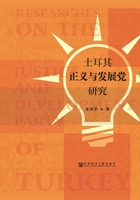
Abstract
This book is about the Justice and Development Party of Turkey as well as its political visions and practices in the political,economical and foreign policy areas. In this book,by using theories of western politics and the theory of the exchange of civilizations put forward by Prof. Peng,the author tries to show the interplays and intercations between the state,societies and political parties in Turkey,to give deep insights to the devopments of Turkey in all areas under AKP’s ruling. The conclusions will be the following.
First,as a result of triangle crsis,namely,the legalitimal crisis,the economic crisis and the intigrational crisis;the reformist in Turkey’s political Islam successfully established AKP. Then,through five nationl elections and three local elections,this party came to the power and became the dominant party in the country’s party system. Historically,the rise of AKP is the result of Turkey’s modernization,democraction,and Europeanization under the context of globalization,liberalization,and democraction. In other word,which is the result of long evolution of Turkey’s politics,economy and society.
Second,under the historial context and the real electional environment,there would be a difficult choice between antomy and systemness for AKP. As to its organizations,it is comprised of central and local organizations as well as parimental groups and disciplinary assembles. As the principals of the organizations,it signifies the mixed characteristics of the centralised democracy,the democratic regime,charismatic leadership and intra-party democracy. As to its nature,we cann’t classify AKP into the Islamist Party,since the party shows the characteristics of the central-right party and the catch-all party at the same time.
Third,as to its ideology and practices,we can conclude the following. In political area,under the guidance of the “Conservative Democracy” idea,the AKP government has carried a number of EU reforms in legal areas and the civilian-millitary relationshiop,in order to further Turkey’s democratization process and to meet the Copenhagen Critiea of the EU. In economic area,under the guidance of the “Revised Neo-Liberalism” idea,the AKP government has taken several mersures to gain the stability and the growth,while furthered Turkey economy’s globalization,liberalization,marketation and privitization. As to the party’s social policy,under the guidance of “Social Participation” idea,the AKP government has carried a number of reforms in the areas of education,health,social security and housing. As to the national-religious policy,under the “Democaratic Openings” idea and the principal of “Negative Secularism”,the AKP government has tried to resolve the long-lagged questions troubling Turkey namely the Kurdish question,the Alevi question,the veiling dispute,etc. In the area of foreign relation,under the doctrine of “Stratagic Depth”,the AKP government has dealt with the European and Asia equally and carried out the “No Problems with Neighbours” policy in order to advance the Ottomanization,Middle-Easternizition and Europeanization. The AKP government has to adapt to the devolpments of the sitituations,tries to promote the Turkish Model to the region and exert its soft power. While gaining triumphs partly,it is faced challenge from the international,regional and domestic levels.
Fourthly,in general,it is growing influence that the Islamist parties has emerged in the Muslim courtries from the Middle East to South Asia to Central Asia to North Afria recently. After analyzing the AKP’s ideology and its practices,this book concludes that the Islamist parties were the results of the Muslim courtries’ modernization process and the historial process,which cann’t be analysed simply. It is necessary for the Islamist party to cautiously deal with the legacies of the modernization process exprienced by the host courtries. In the case of AKP,it is necessary for AKP to deal with the legacies of the modernization process exprienced by Turkey namely the Kemalist legacy,the Ozal legacy,the Islamism legacy and the Ottoman legacy.
In short,the rise of AKP has created the new period of Turkey’s modernization process. In the first decade of 21th century,there were relatively political stability,economic prosperity and social solidarity in Turkey. Despite confirming the triumphs of the AKP government,we must recognize the factors constraining the party to continually further the reforms and expand the depth of the foreign interactions. As to internal exchanges in Turkey,it is critical for AKP how to deal with the relations between the challenge and the reaction,the tradition and modernity,the global and the local,the order and the disorder,etc. Moreover,the relizations of the counciousness of civilization are not only relying on AKP,but also on the mutual efforts of all forces in turkey,namely the collective counciousness.
Key Words: AKP;Turkey;Governing Idea;Practices;Exchanges between Civilizations